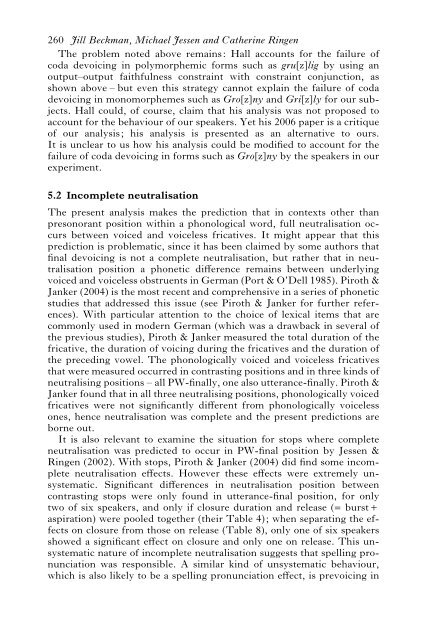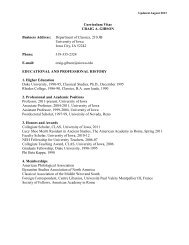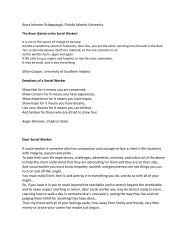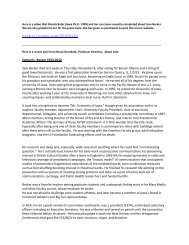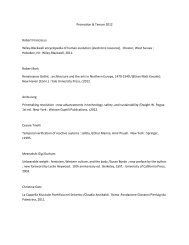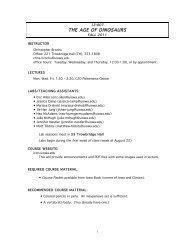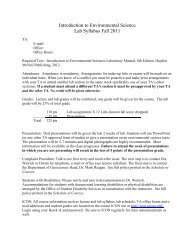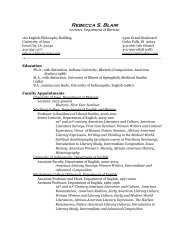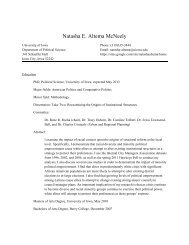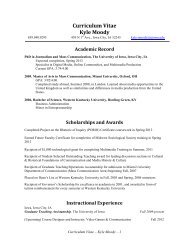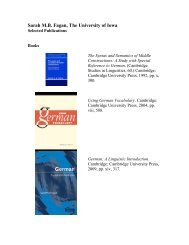German fricatives: coda devoicing or positional faithfulness?
German fricatives: coda devoicing or positional faithfulness?
German fricatives: coda devoicing or positional faithfulness?
You also want an ePaper? Increase the reach of your titles
YUMPU automatically turns print PDFs into web optimized ePapers that Google loves.
260 Jill Beckman, Michael Jessen and Catherine Ringen<br />
The problem noted above remains: Hall accounts f<strong>or</strong> the failure of<br />
<strong>coda</strong> <strong>devoicing</strong> in polym<strong>or</strong>phemic f<strong>or</strong>ms such as gru[z]lig by using an<br />
output–output <strong>faithfulness</strong> constraint with constraint conjunction, as<br />
shown above – but even this strategy cannot explain the failure of <strong>coda</strong><br />
<strong>devoicing</strong> in monom<strong>or</strong>phemes such as Gro[z]ny and Gri[z]ly f<strong>or</strong> our subjects.<br />
Hall could, of course, claim that his analysis was not proposed to<br />
account f<strong>or</strong> the behaviour of our speakers. Yet his 2006 paper is a critique<br />
of our analysis; his analysis is presented as an alternative to ours.<br />
It is unclear to us how his analysis could be modified to account f<strong>or</strong> the<br />
failure of <strong>coda</strong> <strong>devoicing</strong> in f<strong>or</strong>ms such as Gro[z]ny by the speakers in our<br />
experiment.<br />
5.2 Incomplete neutralisation<br />
The present analysis makes the prediction that in contexts other than<br />
preson<strong>or</strong>ant position within a phonological w<strong>or</strong>d, full neutralisation occurs<br />
between voiced and voiceless <strong>fricatives</strong>. It might appear that this<br />
prediction is problematic, since it has been claimed by some auth<strong>or</strong>s that<br />
final <strong>devoicing</strong> is not a complete neutralisation, but rather that in neutralisation<br />
position a phonetic difference remains between underlying<br />
voiced and voiceless obstruents in <strong>German</strong> (P<strong>or</strong>t & O’Dell 1985). Piroth &<br />
Janker (2004) is the most recent and comprehensive in a series of phonetic<br />
studies that addressed this issue (see Piroth & Janker f<strong>or</strong> further references).<br />
With particular attention to the choice of lexical items that are<br />
commonly used in modern <strong>German</strong> (which was a drawback in several of<br />
the previous studies), Piroth & Janker measured the total duration of the<br />
fricative, the duration of voicing during the <strong>fricatives</strong> and the duration of<br />
the preceding vowel. The phonologically voiced and voiceless <strong>fricatives</strong><br />
that were measured occurred in contrasting positions and in three kinds of<br />
neutralising positions – all PW-finally, one also utterance-finally. Piroth &<br />
Janker found that in all three neutralising positions, phonologically voiced<br />
<strong>fricatives</strong> were not significantly different from phonologically voiceless<br />
ones, hence neutralisation was complete and the present predictions are<br />
b<strong>or</strong>ne out.<br />
It is also relevant to examine the situation f<strong>or</strong> stops where complete<br />
neutralisation was predicted to occur in PW-final position by Jessen &<br />
Ringen (2002). With stops, Piroth & Janker (2004) did find some incomplete<br />
neutralisation effects. However these effects were extremely unsystematic.<br />
Significant differences in neutralisation position between<br />
contrasting stops were only found in utterance-final position, f<strong>or</strong> only<br />
two of six speakers, and only if closure duration and release (= burst+<br />
aspiration) were pooled together (their Table 4); when separating the effects<br />
on closure from those on release (Table 8), only one of six speakers<br />
showed a significant effect on closure and only one on release. This unsystematic<br />
nature of incomplete neutralisation suggests that spelling pronunciation<br />
was responsible. A similar kind of unsystematic behaviour,<br />
which is also likely to be a spelling pronunciation effect, is prevoicing in


